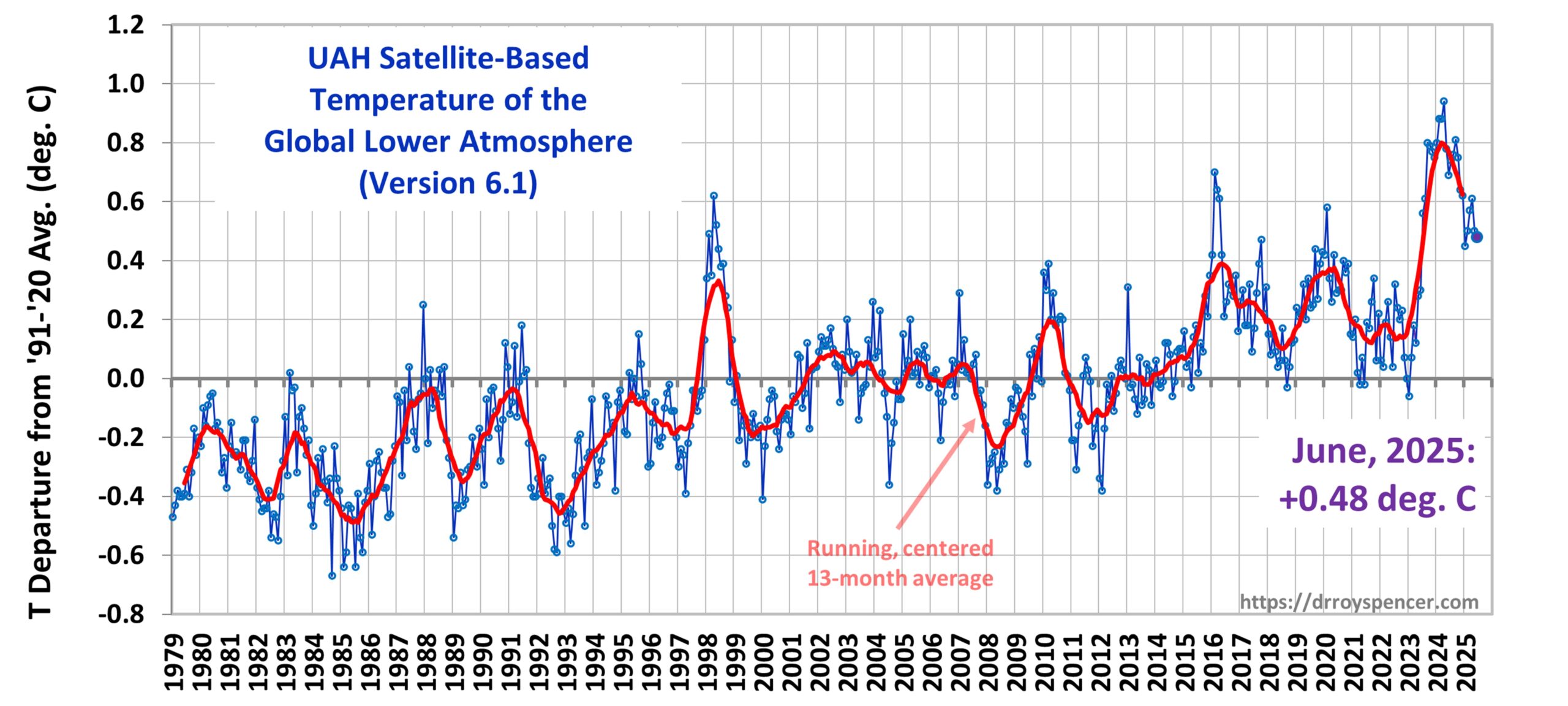DOE says mitigating CO2 not worth it
"Among the key findings, the report concludes that carbon dioxide (CO2) -induced warming appears to be less damaging economically than commonly believed, and that aggressive mitigation strategies could be more harmful than beneficial. Additionally, the report finds that U.S. policy actions are expected to have undetectably small direct impacts on the global climate and any effects will emerge only with long delays."
Link: https://www.energy.gov/topics/climate
Replies to: DOE says mitigating CO2 not worth it
Amazing that all of these govt agencies suddenly have credibility with the Right.
(no message)
I agree with your insinuation that major regulatory decisions are primarily political.
That's why they should always be ratified by elected officials in order to reflect the will of the people and not merely the self-serving agendas of unelected elites from either party.
You taught us that we should believe them w/out question. Why have you stopped?
Though these guys are adding2 and 2 together and getting 4 like rational people, which is a real tell for knowing whom to believe independent of what govt tells us).
Green energy policy to CC = Shut Down to COVID.
(no message)
As we all knew.(Canada’ fires the past 2yrs alone have poured more into the atm than we could ever
saved back btw). A fools errand. And lots of fake studies and fudged data as well.
It was ever an excuse for wealth redirect and fear mongering to achieve political goals.
Sea level is rising…Marine Species are moving towards the poles…and England is
a better place to grow Champagne grapes…
Some people can’t take hint…
If we all chipped in, could we get you to move to one of the poles?
(no message)
I'll ask you...what will it take to convince you that CC is indeed a threat to human habitation?
(no message)
What would it take convince you that it's not top five?
In no specific order (other than white supremacy)
1. Ice age
2. Cosmic impact
3. Disease
4. Volcanism (that no one understands)
5. People choose not to procreate due to climate alarmism.
6. White supremacy, our greatest.threat.
You’re not answering the question…what would it take for you to
accept that CC is a threat to human habitation?
Drs. Curry and Lindzen aren't convinced, and neither are thousands of other scientists
So why should we believe there is cause for concern?
Nobel Prize Winners in Physics are concerned about CC …what would it
take to make you concerned?
It would take Dr. Curry and Dr. Lindzen to be concerned for me to be concerned
(no message)
Both of them accept the physics of CC…they just question the severity….
Sort of like “Doubting Thomases”
Since they accept the physics they have to know that unchecked burning of fossil fuels can only make things worse....here's an overview...
------------------
AI Overview
While both Richard Lindzen and Judith Curry have acknowledged the basic physics of climate change (warming due to greenhouse gases), they both express significant skepticism about the extent and potential impacts of climate change, as well as the scientific consensus surrounding it.
Richard Lindzen: Lindzen has been a vocal critic of what he calls "climate alarmism" and has disputed the scientific consensus on the magnitude and pace of climate change. He is known for his focus on natural climate variability.
Judith Curry: Curry's position is described by some as "neo-skepticism". While she acknowledges the warming trend and the role of greenhouse gases, she emphasizes the complexities and uncertainties of climate models and the influence of natural climate variability. She has also expressed concerns about the potential negative impacts of climate change mitigation policies.
------------------
You're arguing that Mark should get a Nobel Prize? I'm in.
(no message)
Here's an AI overview about how the Earth's Boreal Forests and Oceans are losing their ability to
Buffer increases in atmospheric CO2...i.e. it's only going to get worse...Faster.
------------------------
AI Overview
Both boreal forests and oceans are indeed showing signs of a diminishing capacity to absorb and buffer atmospheric carbon dioxide (CO2), a concerning trend for the global climate.
Boreal forests
Carbon storage: Boreal forests, or taiga, represent a vast biome with significant carbon storage, particularly within their extensive soils due to slow decomposition rates in colder climates.
Risks to carbon sink: Climate change-related factors such as increased wildfires, insect outbreaks, and logging are impacting boreal forests' ability to function as carbon sinks.
Potential tipping point: Some research suggests these forests are at risk of reaching a tipping point, potentially becoming a net source of CO2 rather than a sink, exacerbating global warming.
Oceans
Ocean absorption of warming: Oceans have historically absorbed a substantial portion of the heat from fossil fuel emissions, leading to warming and acidification.
Decreasing buffer capacity: Studies indicate that the ocean's capacity to buffer excess anthropogenic CO2 is decreasing, potentially reducing the proportion of atmospheric CO2 absorbed by oceans in the future.
Ocean acidification: The increasing absorption of CO2 by oceans leads to ocean acidification, which harms marine ecosystems and organisms reliant on carbonate for their shells and structures, like shellfish and corals.
In summary: The declining ability of both boreal forests and oceans to act as carbon sinks and buffers is a critical aspect of climate change, highlighting the urgency of reducing greenhouse gas emissions and adopting sustainable land management practices to mitigate these impacts.
-------------------
Impacts of a 4 degree C global warming...
NOAA data shows CO2 concentration accelerating...and Dr. Roy Spencer's Global Temperature doing the same. A 4 deg. C rise is definitely in play if we don't take action.
Link: https://www.greenfacts.org/en/impacts-global-warming/l-2/index.htm
Yet another Homer Simpson post
(no message)
Link: https://www.youtube.com/watch?v=7tzfl1wTemM
Consent Management

